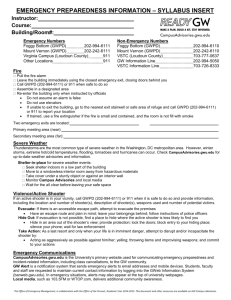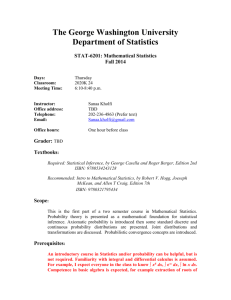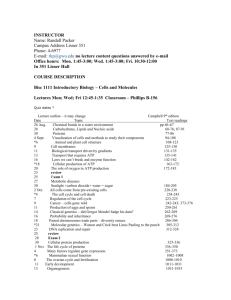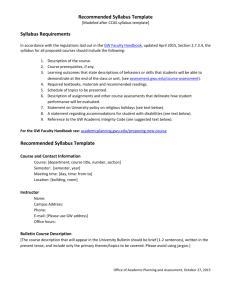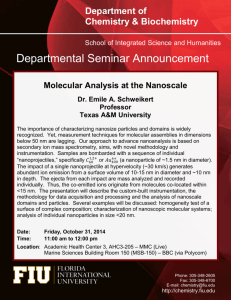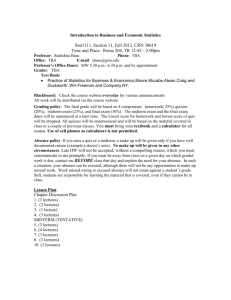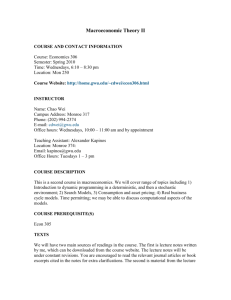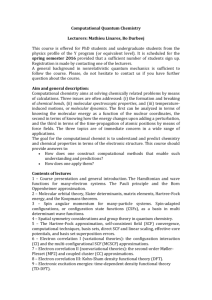COURSE AND CONTACT INFORMATION: Course
advertisement
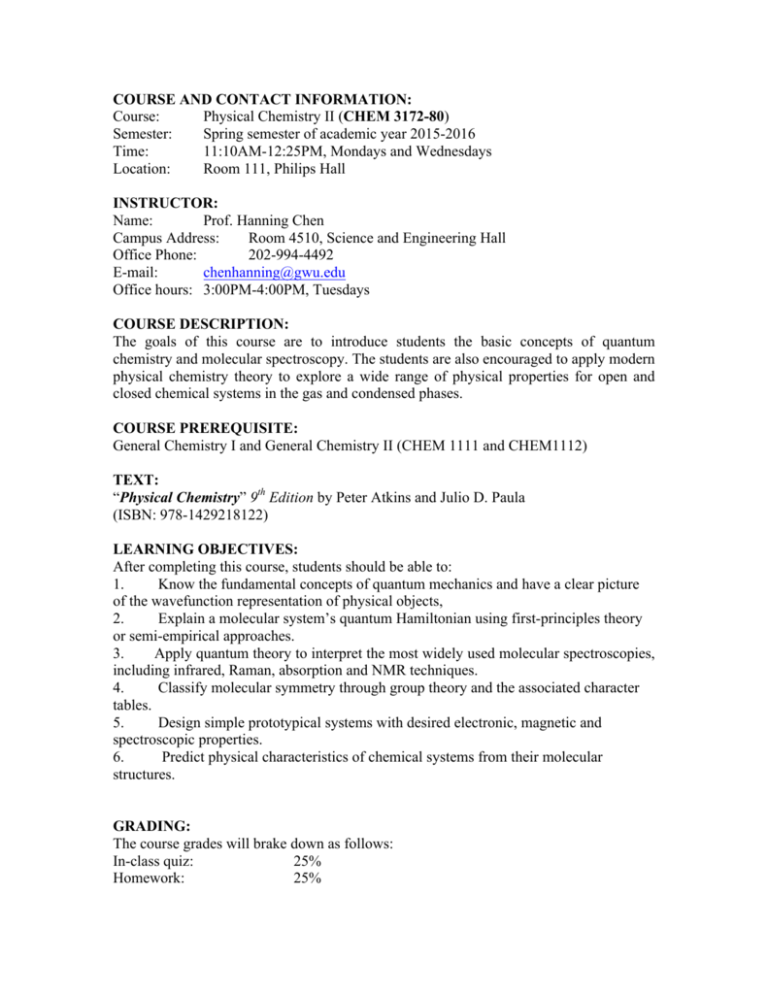
COURSE AND CONTACT INFORMATION: Course: Physical Chemistry II (CHEM 3172-80) Semester: Spring semester of academic year 2015-2016 Time: 11:10AM-12:25PM, Mondays and Wednesdays Location: Room 111, Philips Hall INSTRUCTOR: Name: Prof. Hanning Chen Campus Address: Room 4510, Science and Engineering Hall Office Phone: 202-994-4492 E-mail: chenhanning@gwu.edu Office hours: 3:00PM-4:00PM, Tuesdays COURSE DESCRIPTION: The goals of this course are to introduce students the basic concepts of quantum chemistry and molecular spectroscopy. The students are also encouraged to apply modern physical chemistry theory to explore a wide range of physical properties for open and closed chemical systems in the gas and condensed phases. COURSE PREREQUISITE: General Chemistry I and General Chemistry II (CHEM 1111 and CHEM1112) TEXT: “Physical Chemistry” 9th Edition by Peter Atkins and Julio D. Paula (ISBN: 978-1429218122) LEARNING OBJECTIVES: After completing this course, students should be able to: 1. Know the fundamental concepts of quantum mechanics and have a clear picture of the wavefunction representation of physical objects, 2. Explain a molecular system’s quantum Hamiltonian using first-principles theory or semi-empirical approaches. 3. Apply quantum theory to interpret the most widely used molecular spectroscopies, including infrared, Raman, absorption and NMR techniques. 4. Classify molecular symmetry through group theory and the associated character tables. 5. Design simple prototypical systems with desired electronic, magnetic and spectroscopic properties. 6. Predict physical characteristics of chemical systems from their molecular structures. GRADING: The course grades will brake down as follows: In-class quiz: 25% Homework: 25% Midterm examination: Final examination: 25% 25% Final letter grades will be determined by a curve with the average grade around B+. Beginning 01/14/2015 (Wednesday), a quiz will be held in the first 10 minutes of a lecture to assess students’ understanding of the materials from an immediate past lecture. No time extension or make-up will be given if you come to class late. Homework problems will be assigned at the end of each lecture, and should be handed in by its designated deadline to my departmental mailbox. A homework assignment submitted after deadline will still be graded, although no credit will be received. A midterm examination will be held on 03/02/2016 (Wednesday) to cover the content from Lecture 1 through Lecture 13. The final examination is schedule on 05/02/2016 (Monday) to cover the content from Lecture 14 through Lecture 26. No student will be excused from taking an exam without prior permission from Prof. Hanning Chen. If you believe that you have a valid reason for requesting a reschedule of the midterm or/and final examinations, please contact me no later than 72 hours before the examination either in person, in writing, by phone or by email. ACADEMIC INTEGRITY: Students are expected to do their own quizzes, homework and examinations without plagiarizing or group discussion. Any activity that tends to compromise the academic integrity will be reported immediately to the Office of Academic Integrity. (http://www.gwu.edu/~ntegrity) SCHEDULE OF TOPICS: Lecture 1 to Lecture 3: Introduction to Quantum Mechanical Principles. Lecture 4 to Lecture 7: and Rotation. Quantum Modeling of Molecular Translation, Vibration Lecture 8 to Lecture 11: Atomic Orbital and Structure Lecture 12 to Lecture 13: Valence Bond Theory and Molecular Orbital Theory. Midterm Examination: Lecture 14: Semi-Empirical Huckel Theory. Lecture 15 to Lecture 16: Molecular Symmetry and Group Theory. Lecture 17 to Lecture 21: Spectroscopies. Molecular Rotational, Vibrational and Electronic Lecture 22 to Lecture 24: Nuclear Magnetic Resonance and Its Fine Structure. Lecture 25 to Lecture 26: Electron Paramagnetic Resonance Religious Holiday Policy Respect for diversity is one of GW's core values, extending to all aspects of our community. In keeping with this value, the university has adopted guidelines, recommended by the Faculty Senate, that ensure students and faculty may observe religious holidays without academic penalty. SUPPORT FOR STUDENTS OUTSIDE THE CLASSROOM DISABILITY SUPPORT SERVICES (DSS). Any student who feels s/he may need an accommodation based on the impact of a disability should contact the Disability Support Services office at 202-994-8250, to establish eligibility and to coordinate reasonable accommodations. At a student's request, DSS prepares an individualized letter to professors which verifies the nature of the student's disability and documents the need for auxiliary aids and services and/or academic adjustments. Students are encouraged to meet with each professor early in the semester to discuss the academic implications of the disability as they relate to the specific course and to request accommodation. For additional information please refer to: http://gwired.gwu.edu/dss/. UNIVERSITY COUNSELING CENTER (UCC) 202-994-5300. The University Counseling Center (UCC) offers 24/7 assistance and referral to address students' personal, social, career, and study skills problems. Services for students include: Ø academic support services: http://gwired.gwu.edu/counsel/AcademicSupport/ Ø crisis consultations at 202-994-5300 (24/7) Ø confidential counseling services (individual and small group) Ø podcasts and self-help materials on website: http://gwired.gwu.edu/counsel/PodCast/ http://gwired.gwu.edu/counsel/ResourcesforStu dents/ EMERGENCY PREPAREDNESS INFORMATION – SYLLABUS INSERT Instructor: Course: Building/Room#: EMERGENCY NUMBERS Foggy Bottom (GWPD) Mount Vernon (GWPD) VSTC (Loudoun County) Other Locations 202-994-6111 202-242-6111 911 911 NON-EMERGENCY NUMBERS Foggy Bottom (GWPD) Mount Vernon (GWPD) 202-994-6110 202-242-6110 GW Information Line VSTC Information Line 202-994-5050 571-553-8333 Fire Pull the fire alarm Leave the building immediately using the closest emergency exit, closing doors behind you Call GWPD (202-994-6111) or 911 when safe to do so Assemble in a designated area Re-enter the building only when instructed by emergency officials • Do not assume an alarm is false • USE STAIRS, do not use elevators • If unable to exit the building, go to the nearest exit stairwell or safe area of refuge and call GWPD (202-994-6111) or 911 to report your location • If trained, use a fire extinguisher if the fire is small and contained and the room is not fill with smoke Two emergency exits are located: Primary meeting area (near): Secondary meeting area (far): Severe Weather Thunderstorms are the most common type of severe weather in the Washington, DC metropolitan area. However, winter storms, extreme hot/cold temperatures, flooding, tornadoes and hurricanes can occur. Check CampusAdvisories.gwu.edu for up-to-date weather advisories and information. Shelter-in-place for severe weather events: Seek shelter indoors in a low part of the building Move to a windowless interior room away from hazardous materials Take cover under a sturdy object or against an interior wall Monitor Campus Advisories and local media Wait for the all clear before leaving your safe space Violence/Active Shooter If an active shooter is in your vicinity, call GWPD (202-994-6111) or 911 when it is safe to do so and provide information, including the location and number of shooter(s), description of shooter(s), weapons used and number of potential victims. Evacuate: If there is an accessible escape path, attempt to evacuate the premises • Have an escape route and plan in mind; leave your belongings behind; follow instructions of police officers Hide Out: If evacuation is not possible, find a place to hide where the active shooter is less likely to find you • Hide in an area out of the shooter’s view; provide protection; lock the doors; block entry to your hiding place; silence your phone; wait for law enforcement Take Action: As a last resort and only when your life is in imminent danger, attempt to disrupt and/or incapacitate the shooter by: • Acting as aggressively as possible against him/her; yelling; throwing items and improvising weapons; and commit to your actions Emergency Communications CampusAdvisories.gwu.edu is the university’s primary website used for communicating emergency preparedness and incident-related information (including class cancellations) to the GW community. GW Alert is a notification system that sends emergency alerts to email addresses and mobile devices. Students, faculty and staff are requested to maintain current contact information and campus location information by logging into the GWeb Information System (banweb.gwu.edu). In emergency situations, alerts may also appear at the top of university webpages. Media Outlets, such as 103.5FM or WTOP, may be contact with emergency information, such as weather-related delays and closing. The Office of Emergency Management, in collaboration with the Office of the Provost, Academic Year 2015-2016. This document and other resources are available on GW Campus Advisories.
